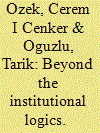| Srl | Item |
| 1 |
ID:
126675


|
|
|
|
|
| Publication |
2013.
|
| Summary/Abstract |
This article aims to explain the slowing down of European Union (EU)-Turkish relations since the start of the accession negotiations in 2005 with international level systemic analysis. For this purpose, it examines the current challenges the new rising powers pose to the US-led unipolar international order and it shows how both the EU's and Turkey's responses to these challenges influence their relative powers as well as the negotiation process. By focusing on international level systemic dynamics, the article differs from the institutional explanations that explain EU-Turkish relations either with the utility-based logic of consequentialism or the norms-based logic of appropriateness.
|
|
|
|
|
|
|
|
|
|
|
|
|
|
|
|
| 2 |
ID:
117860


|
|
|
|
|
| Publication |
2012.
|
| Summary/Abstract |
Turkey is of paramount importance to the United States and to the European Union. The United States is not only the first and foremost partner of both the EU and Turkey. It is also amongst the most committed supporters of Turkey's European integration. In support of Turkey's EU membership bid, Washington has set forth a variety of arguments and has attempted to influence EU decisions at different points in time. US advocacy throughout the 1990s was key to kick-starting Turkey's accession process. By contrast, US influence on Turkey's EU accession decreased visibly in the twenty-first century. The style of US advocacy goes some way towards explaining why this has been the case. When American advocacy has prioritized quiet, behind-closed-doors diplomacy it has tended to be more effective. When instead US officials have relied on loud public diplomacy, European reactions have been generally negative. More importantly however, it is the content of American arguments that has affected their relative impact on European perceptions of Turkey. Depending on whether the US has spoken to the rights-, the interest- or the identity-based logic of enlargement, the influence of the United States on Turkey's EU membership prospects has varied. On the grounds of this analysis, this article concludes by outlining broad policy suggestions regarding how the United States could contribute more effectively to Turkey's European integration.
|
|
|
|
|
|
|
|
|
|
|
|
|
|
|
|